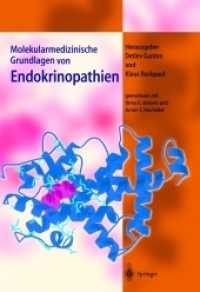- ホーム
- > 洋書
- > ドイツ書
- > Humanities, Arts & Music
- > History
Description
(Text)
According to estimates, there are over 100,000 video testimonies with victims of National Socialism. Many of the interview archives are easily accessed, including some that are available in the Internet for free. While teachers are hesitant in making use of this treasure of source materials, learners are familiar with the figure of the eye-witness as communicated via film and television. But what can be taught with the help of what in cinematographic terms is often criticised as "talking heads"? What constitutes a good learning setting? And how do users interact with the - usually digitised - video testimonies and the collections that are often available online? In January 2017 experienced educators and researchers attended an international workshop on "Localisation of video testimonies with victims of National Socialism in educational Programmes" and discussed the question of what is good practice in this specific form of educational work. This volume is the result of that process. It provides an insight into the conceptual and practical ideas on which the various programmes are based. The book also has a focus on video testimonies presented at historical exhibitions and includes contributions from many countries, such as Belarus, Canada, Israel, Macedonia, the Netherlands and South Africa.
(Author portrait)
Werner Dreier is the founding director of _erinnern.at_ National Socialism and the Holocaust: Memory and Present, an institution for teacher training that develops materials for the Austrian Ministry of Education. Since 2001, he has been the Austrian delegate and chairman (2010 - 11) of the education working group of the International Holocaust Remembrance Alliance. An historian with a special interest in the history of antisemitism, National Socialism and Austro-fascism, Dr Dreier taught history from 1984 to 2001. In 2015 - 16 he was responsible for a transnational research project looking into teaching using videotaped testimonies (Shoah in the classroom - historical learning using video interviews with survivors in a tablet-based learning environment.)Angelika Laumer is doing a PhD at the International Graduate Centre for the Study of Culture (GCSC) in Giessen, Germany, with a thesis on remembering and forgetting forced labour in rural Bavaria. She directed the documentary Szukajac Emila - Looking for Emil in 2011, which focuses on a village community's memory of forced labour under the Nazis. She is the author of "Getting rural: a plea for critical research on National Socialist crimes in rural areas" In Bonnesoeur, F. et al. (2017). Occupation - Annihilation - Forced Labour. Metropol. She graduated in political science in Berlin and studied in Lyon and Mumbai. Research interests include ethnography, habitus, and the history of "Heimatlose Auslaender" (homeless foreigners) in West Germany.Moritz Wein is a research associate and communications officer at _erinnern.at_. National Socialism and the Holocaust: Memory and Present, an institution for teacher training that develops educational materials for the Austrian Ministry of Education. Previously, he worked as an educator at the Mauthausen Memorial and as a human rights officer at the Austrian Students' Union. He studied political science at the University of Vienna, Sciences Po in Paris and at the Center for Conflict Studies at the Philipps University in Marburg, focusing on Holocaust studies, rightwing extremism and antisemitism; he wrote his master's thesis on European Parliament's debates on countering antisemitism.
-

- 電子書籍
- おつぼみさま 中間世代の小さなときめき…
-

- 電子書籍
- ひみつの花園





